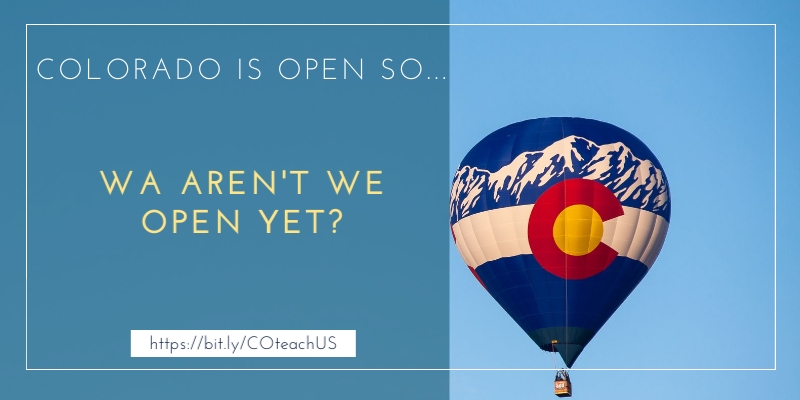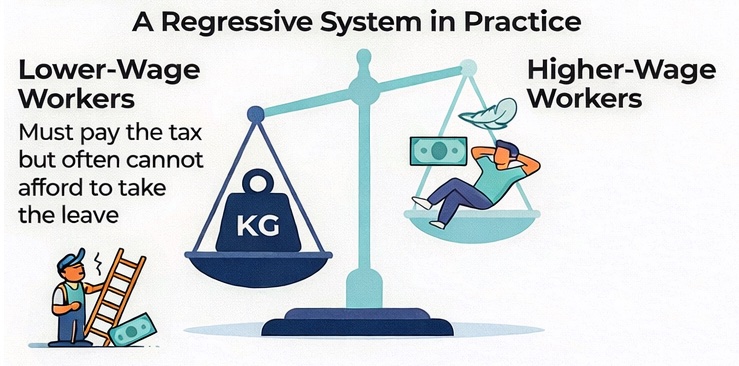On April 27, Governor Inslee announced that Colorado was joining the Western states COVID pact, “a working group of Western state governors with a shared vision for modifying stay at home orders and fighting COVID-19.” The release said:
“Coloradans are working together to slow the spread of COVID-19 and have important information to share with and to gain from other states. I’m thrilled Colorado is joining the Western States Pact," Gov. Jared Polis said. "There’s no silver bullet that will solve this pandemic until there is a cure so we must have a multifaceted and bold approach in order to slow the spread of the virus, keep our people safe and help our economy rebound.”
On April 28, Governor Inslee was asked about his fellow Democratic Governor and said this: “Jared Polis is a really smart individual and I generally would trust his decision making."
A day before joining the Western states COVID pact, Governor Polis issued an executive order to start re-opening Colorado for business. From his press release:
“Together, Coloradans have been effective in leveling and flattening the curve, but life will remain much more dangerous than usual these next few months and we should all wear masks when in public. Safer at Home is by no means a free-for-all. My administration has acted boldly in the face of this pandemic and is focused on ensuring our state can endure on the trail ahead. We all have a personal responsibility to slow the spread of the virus and must find a way of living that is psychologically and economically sustainable for Coloradans.”
Colorado’s “Safer at home” phase began on April 27 allowing some nonessential businesses to reopen for curbside pickup. On May 1, personal-care services and retail businesses were allowed to reopen with strict social-distancing measures in place. On May 4, offices will be allowed to reopen at 50 percent capacity. Bars and restaurants, however, will remain closed to in-person dining at least until mid-May.
Colorado’s total COVID infection and death numbers have been comparable to Washington’s.
Governor Polis was interviewed on May 1 by Colorado Public Radio to explain why his state is now open for many businesses. Here are some of his answers pulled from the transcript:
- “…the data that was presented to us said that the end of the Stay-At-Home order date simply does not matter in terms of when the peak, of what the peak is of how many people are affected by Coronavirus. All that it determines is the timing of this and that's what we've talked about from the very start. There was never any plan in Colorado or America to eliminate Coronavirus. That might be possible in island nations like Taiwan and New Zealand, I think they've succeeded. We wish them well. We have over a million cases. The goal was to spread it out and the way you spread it out is you have social distancing over time, so there's no data that's been presented to us that says that Stay-At-Home has anything to do with what the level of that peak is. It only has to do with the timing of the peak.”
- “This virus is here for the future. So you can do one of two things. You can either say, we're not going to have salons as part of our society because we're going to keep them closed in May and June, July, and August, September, October, November. They'll be closed forever. Or they open up with strict precautions because it's not going to be any safer now than it is in September or December. I mean, it's the virus is out there. It's still going to be there. So it's about figuring out how to do the things that we need to do in our lives and I think most Coloradans would say, yeah, we, we like having, you know, an institution like salons, we think that that should exist as opposed to not exist. So let's figure out how to do it in a safe way.”
- “I think there's some people that are in a position where they can Stay-At-Home for a very long period of time, for six months or a year, minimize their interactions, wear masks, go to the grocery store. If that's the way people want to live their lives for six months or a year, then they do significantly reduce their chances of contracting coronavirus and effectively what they're doing is they're waiting it out until there's a vaccine, which could be nine months, 12 months, 18 months. I think there will be, Ryan, and even before a vaccine, and there can be therapies and cures that have some improvement on the situation. We might be on the threshold of some of those marginal ones already. So yeah, there, there will be some people that can do that, but obviously the vast majority of people can't do that. They can't not earn income and work for a year. Most people can't do that. So many of them will encounter the virus absolutely. And many have already.”
- “… the goal is really to really find site-based or community-based outbreaks and act boldly and decisively with regard to those sites. So what that means is if there's an outbreak at a particular factory or building, you lock down the folks and put people in quarantine in and around that rather than the whole city, rather than the whole County and rather than the whole state. So it doesn't mean there won't be times when Stay-At-Home might be required of certain people in this state at certain times. But we hope to be able to do that earlier with the visibility, you talked about the importance of testing. Testing is a key piece of that early visibility into where outbreaks are occurring. So we can take strong site-specific actions rather than wait until they lead to the need for statewide action.”
- “…there's going to be belt tightening across our entire economy. I mean families are feeling it in lost income. Cities and counties are feeling and of course the state government's going to be feeling that too. Now we don't know exactly what that'll look like yet for two reasons. One is we're waiting on our budget projections. They come out the second week in May. That's what we're going to base this off of. The second is the federal government has already authorized one bunch of money for states and local governments and they're likely to do another that will also be part of the budget. But yeah, of course it's appropriate that in, in difficult economic times, the private sector tightens their belt, families do and so does the state.”
Hopefully as a member of the Western states COVID pact, Governor Polis is actively sharing this information with Washington.






